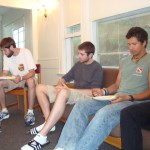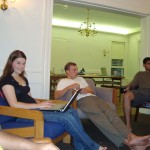The First Reeder Fellows Discussion of the Fall 2009 Semester
I THINK. I ADAPT. I EVOLVE

Date: September 8th, 2009
Time: dinner at 6pm, discussion starts at 6.30pm
Please RSVP at hasegand@lafayette.edu at least 12h in advance if you are coming to dinner too so we can make sure we have enough food for everybody.
Location: Reeder Fellows House Lounge
Don’t know how to find us? Here‘s something to help you.
TOPIC: I think. I adapt. I evolve
Charles Robert Darwin (1809 – 1882) was an English naturalist who realised and presented compelling evidence that all species of life have evolved over time from common ancestors, through the process he called natural selection. The fact that evolution occurs became accepted by the scientific community and much of the general public in his lifetime, but it was not until the emergence of the modern evolutionary synthesis from the 1930s to the 1950s that a broad consensus developed that natural selection was the basic mechanism of evolution. In modified form, Darwin’s scientific discovery is the unifying theory of the life sciences, explaining the diversity of life.
How did the theory of evolution changed the way we see ourselves as a species?
And how about influence on the purpose of our lives?
How can we reconcile the theory of evolution with the religious faith?
Sources of information:
- The Linean Society of London: Darwin-Wallace Paper Website. PDF.
- Charles Darwin Wikipedia INFO
- “TED2008: What is Life?”. Unedited running notes from the TED2008 conference in Monterey, California. Third session
- Pondering Evolution is Life Changing by David Sunderlin
- VIDEO: Darwin’s Theory is fundamental to biological research at scientific institutions
- Darwin’s Legacy – William Durhan’s Course from Stanford



